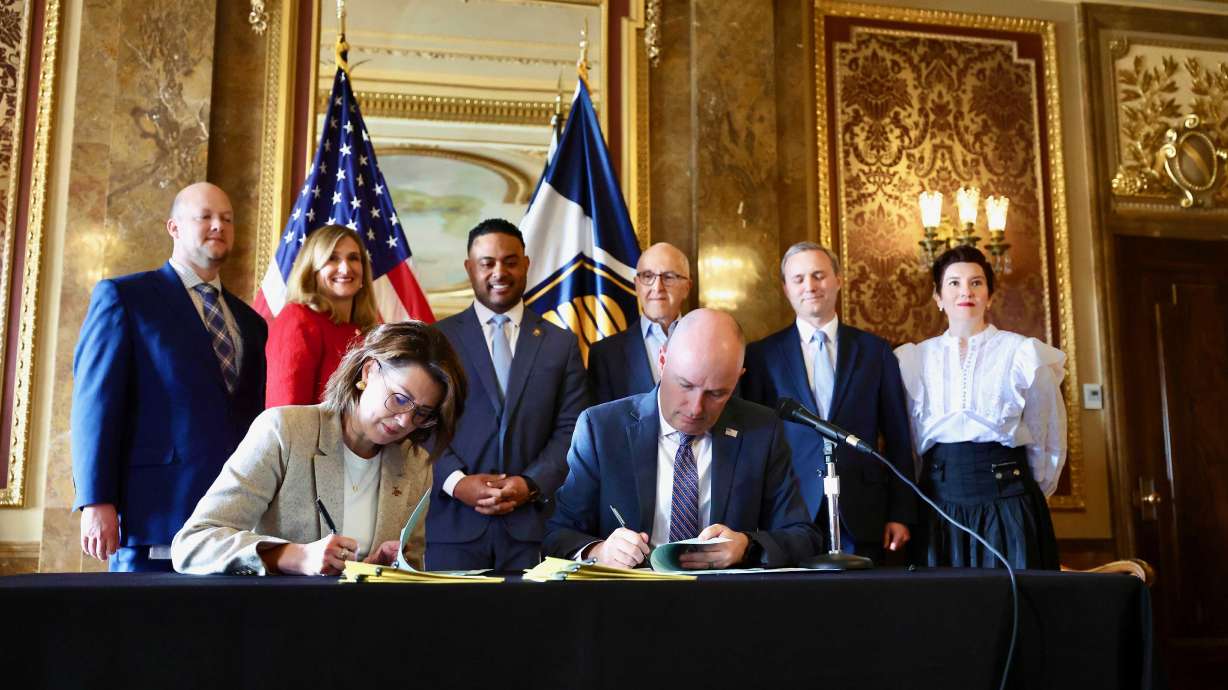Estimated read time: 4-5 minutes
- Social psychologist Jonathan Haidt praised Utah's laws on children's social media use and Gov. Spencer Cox.
- Cox and lawmakers celebrated several bills addressing online safety.
- New laws include cellphone bans in schools and data control rights for Utahns.
SALT LAKE CITY — Social psychologist and author Jonathan Haidt is one of the most influential voices helping shape Utah's laws regulating big tech and social media use for children.
Utah Gov. Spencer Cox has often referenced Haidt's work as state lawmakers have targeted large social media platforms through legislation and the courts in recent years. When Haidt's book, "The Anxious Generation," was named the bestselling audiobook in May last year, Cox took to X to promote it as a must-read for practically anyone with children in their life.
Haidt returned the favor earlier this week, praising Cox and Utah for their approach to limiting cellphone use in schools and regulations on social media in a conversation with the New York Times' Ezra Klein.
"Utah is interesting here because out of every state, it has still the strongest religious culture because of The Church of Jesus Christ of Latter-day Saints. And they have, by far, the strongest regulations on social media around children," said Klein, a columnist and host of "The Ezra Klein Show" podcast. "You sort of see the way those two things — that moral framework and that willingness to regulate what feels like a vice — is happening there."
"They also have a really excellent governor. Gov. Spencer Cox has been just superb," Haidt added. "He wants to make Utah the most family-friendly state — many states want to. And if we feel that we can't let our kids out, and our kids are rotting away on screens, and there are screens all day in the school, that's not a family-friendly place. So, yes, Utah has been great on this."
Cox said he appreciated the recognition but had one caveat.
"They bring up Utah as an example, and specifically they said that Utah is trying to be the most family-friendly state in the nation. I don't think we're just trying; I think we're succeeding," the governor said Friday. "We care about kids and strengthening families, strengthening parents."
The ceremonial signing included several lawmakers and stakeholders gathered in the Gold Room at the state Capitol to celebrate Cox signing online safety bills into law, including the bill banning cellphone use during class time — a first-of-its-kind bill giving Utahns rights to control the data collected by social media companies, and another bill requiring app stores to verify the ages of users.
The governor previously called the data protection bill his favorite bill of the session, and on Friday said it is "as big a piece of legislation as I have ever seen a freshman (lawmaker) run." That lawmaker, Rep. Doug Fiefia, R-Herriman, said the bill is meant to "shift power back to where it always should have remained — with the people."
School districts across Utah have already begun addressing phone use during school, but SB178 creates a statewide default limiting phone use during class.
Cox called it "maybe one of the most important things that we've done in a decade," but said he hopes lawmakers will take the further step of limiting phone use during lunch and class breaks — a policy he hopes would force students to prioritize in-person connection.
"The first couple days it's a little rough, like when you take drugs away from an addict," he said. "Then something magical happens: They all become converted."
A pair of Utah high school seniors who helped push for the bill can attest to that conversion. Timpview High School in Provo implemented a phone policy after the first semester last year, according to senior Milan Venegas, who said he initially didn't know the names of two students who sat directly in front of him in his English class because they were often on their phones during group projects.
"When that second semester came, we were finally able to start talking with them and engaging with them," he said. "They're really cool. They also had lots of great thoughts about what we were reading in our classes ... that I wish we maybe had (during) our first semester if they were not on their phones."
Some schools allow teachers to set their own rules about phone use. At Green Canyon High School in North Logan, senior Avery Gonzales said she noticed a drastic improvement in her concurrent enrollment classes, where phones are typically off-limits.
"I can see the difference with students. I'm having conversations with them. I'm interacting with them. No one's on their phone," she said. "Students are happier; it's like a whole switch of environment."










